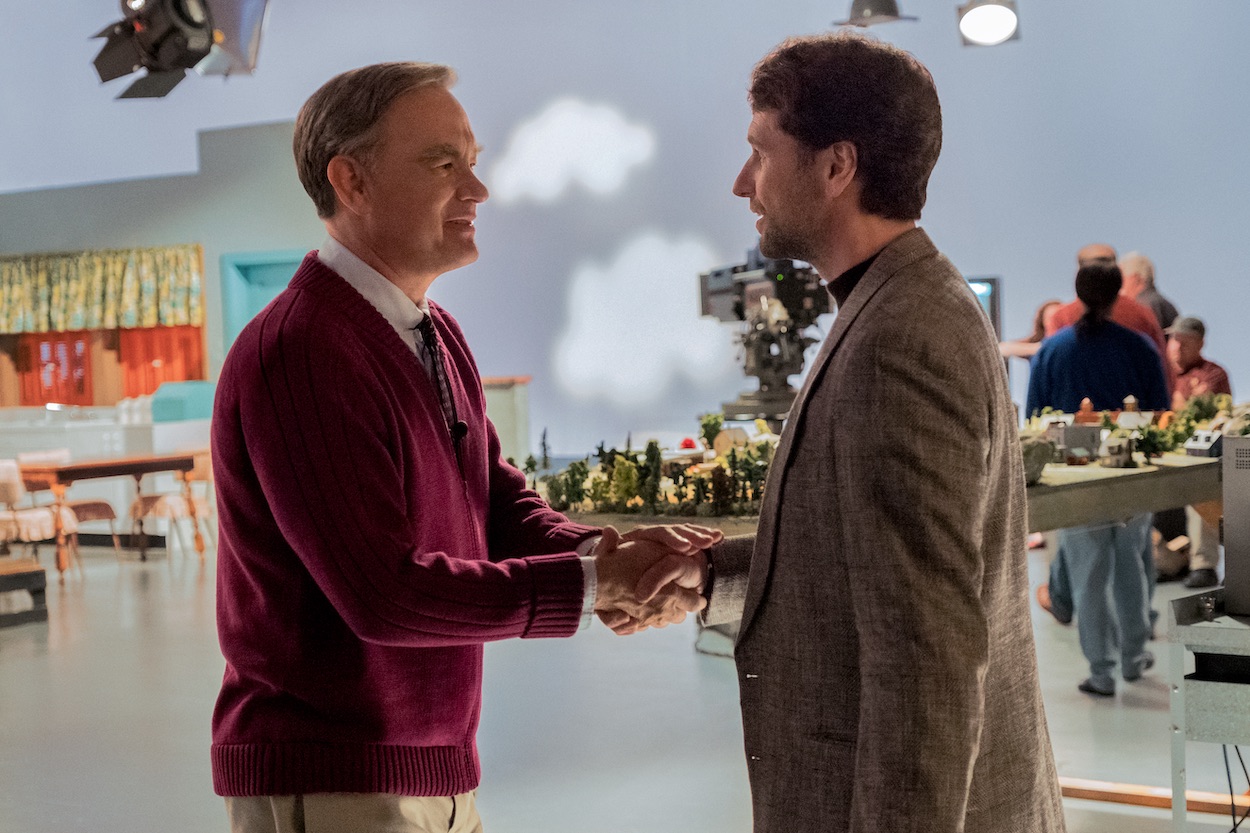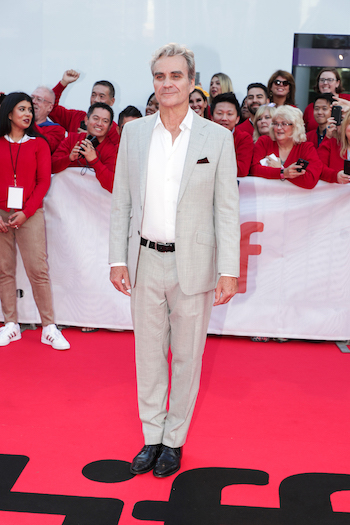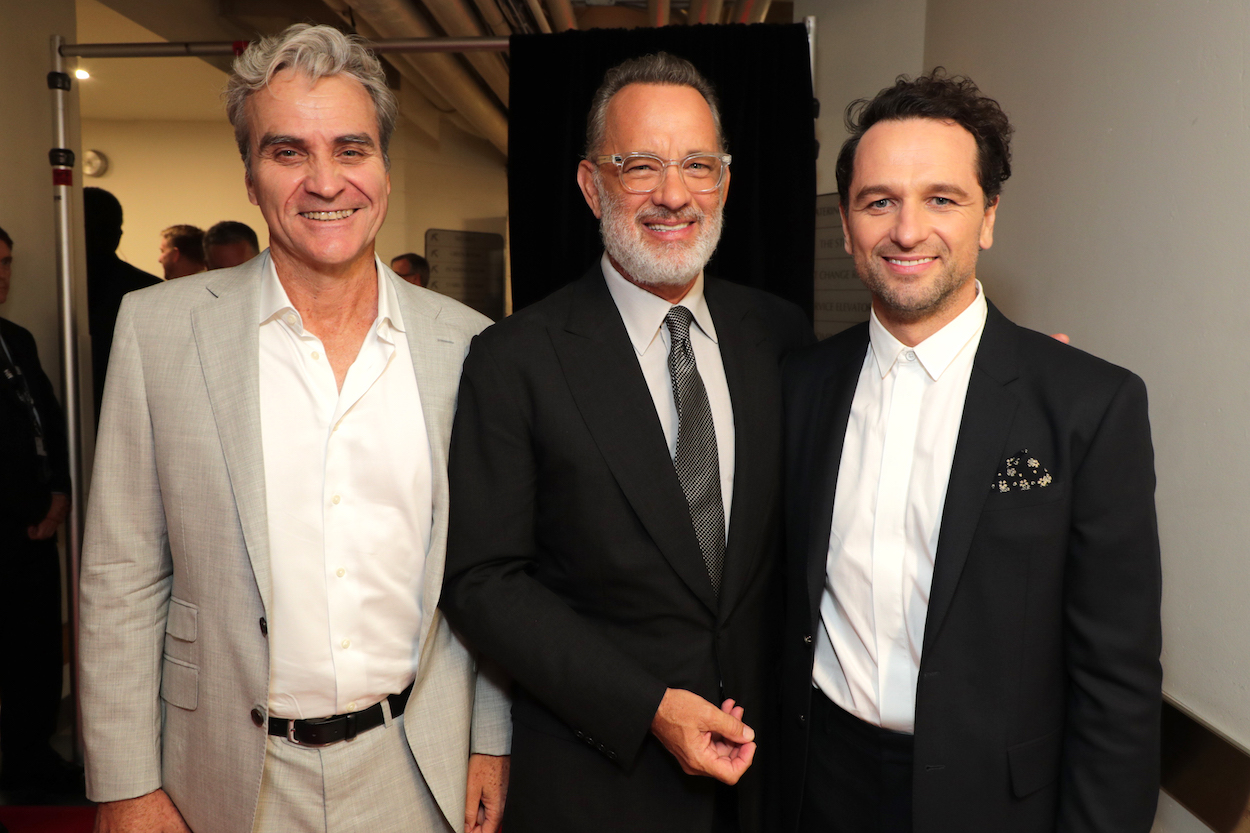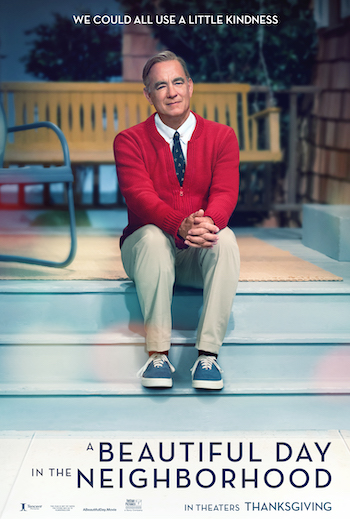
When you enter the theater to watch A Beautiful Day in the Neighborhood–and yes, you absolutely should see it as soon as possible–I encourage you to check your expectations at the door. The film is, in my mind, definitely not a biopic. So any qualms that you may feel about Tom Hanks not looking like Mr. Rogers? Just hang those up in the coat closet as you enter the living room and don your cardigan and change into your comfy shoes. Then ready yourself for a mystical experience in storytelling.
Inspired by the article “Can You Say. . . Hero?” by Tom Junod, A Beautiful Day in the Neighborhood is very much a look at how a beloved children’s television star interacts with a hardened journalist who has been assigned to write a brief magazine profile. In the movie, we journey alongside Lloyd Vogel (Matthew Rhys)–the character based upon Junod–as he is profoundly impacted by Mr. Rogers’ compassionate ministry of accompaniment. I will be offering my review soon, but today I’m happy to invite you into a discussion I had with Tom Junod about this film, what he learned from Fred Rogers over the years of their friendship, and how it has impacted his life and work.
My conversation with Tom Junod, shared here, has been lightly edited for clarity. LMH
Synopsis:
Tom Hanks portrays Mister Rogers in A Beautiful Day in the Neighborhood, a timely story of kindness triumphing over cynicism, based on the true story of a real-life friendship between Fred Rogers and journalist Tom Junod. After a jaded magazine writer (Emmy winner Matthew Rhys) is assigned a profile of Fred Rogers, he overcomes his skepticism, learning about kindness, love and forgiveness from America’s most beloved neighbor.
First of all, how does it feel right now to be going through everything you’re going through you with the film being released? You experienced an initial wave of attention when the documentary Won’t You Be My Neighbor came out, but now it’s even bigger because this is, in a way, based upon your life story.
It’s the kind of situation where if someone had told me twenty years ago that I’d be doing this right now, it would seem so far-fetched. I would have laughed at it because not only is it my life up there, but also my life down here, away from the screen, to really kind of talk about the message of this man, Fred Rogers. And that’s what’s made me comfortable with this. The fact that I’m speaking of Fred and my experience with Fred, and the truths that I believe that Fred represents has made it really one of the most exciting times in my life. It just is… it’s hard to describe.

I was a huge fan of the documentary and I love this movie. But when I saw the screener of A Beautiful Day in the Neighborhood it felt different immediately. First of all, I attended the screening in a theater filled with actors and Industry people. So, it was interesting because it was a big theater, and everyone just went crazy when they saw the film… it was so well received, not surprisingly! But I’ll say that it wasn’t what I was expecting because in a way to me the film feels very much like a parable. Although it is biographical in nature, there is such a clear storytelling element.
Yes! Because Fred’s telling you the story. I mean, that’s the coolest thing about it. There’s a technical term for it: breaking down the fourth wall. But that’s what it is. He is telling you the story from the beginning to the end.
Your character is renamed in the film, but in a sense, we see you experience Fred Rogers through his ministry too.
You do, and it is a ministry… that is what Fred called it. I’m still very good friends with Joanne Rogers his wife, and that’s what she calls it too. That’s what I call it in the recent Atlantic story.
I think that the film itself is a highly unusual movie. It’s unusual in its concerns, it’s unusual in its storytelling, and it’s unusual in its pace. It stands out. I don’t know if I’ve ever seen a movie quite like it, but I certainly have not seen a movie quite like it in many, many years. When is the last time you saw a movie that begins as its stated goal to be about forgiveness? I mean, it’s unbelievable. And you know to me that is… it’s a breathtaking moment. I mean, it’s a very, very quiet movie on purpose, and it’s a very, very slow movie on purpose. But I mean, I think it’s audacious.
We have that opportunity to kind of linger in what’s being taught. And that takes an attention span that sometimes doesn’t exist in the same way these days. You referenced this your Atlantic piece… the way that the internet has impacted our attention span as readers and as viewers. We’re used to these very quick spaced, 280 characters or less, six-second video kind of snippets of life. And this is a piece that invites us to sit in it and to linger with it. So how do you kind of think that audiences are going to react to that versus what they walk in expecting of the film?
Well, I can only go by what I’ve experienced and what I’ve seen. I’ve seen the movie now three times. I saw it once completely by myself at a screening room in New York, and I saw it with a film festival audience, and I saw it last night at the Landmark on Pico as part of Steven Farber’s screening series. So, it was a pretty packed house. My feeling is that people seem to get it and they seem to experience it. That’s the thing that I just really like about it: it is challenging in the same way that Fred was.
There are times when the Lloyd Vogel character is very uncomfortable and that seeps through the fourth wall as well. The movie makes you uncomfortable. The lingering camera, the lingering stare… you know, all of it. And then that all culminates into what I believe is the greatest special effect of the year: the minute of silence.
When you see that in a crowded theater and you hear the sound level just go silent… and you ask yourself, “Are they really going to do this?” And they really do it! There are so many things like this that I’m proud of with the film.
You’ve spoken of how the filmmakers approached you initially and inquired about your story. But what was it like learning that Tom Hanks would be attached to the project?
Right, that changed everything you know. It really, it really did. It changed everything. It made this project a major motion picture.

Did you have a period of wondering, “Oh my gosh, what is this going to do to my life?” when that happened?
No, no. I’ve always thought that Fred’s message was a necessary one because it was necessary for me. And so, the fact that there was going to be a large movie coming out about Fred Rogers, I mean it struck me as, in a very secular way, a miracle.
It is such a gift, and I almost think the timing is… I do believe in miracles, and I believe in intercession, and I think that the film is coming at a time when we really need it and that it will be a real gift. Especially entering in into entering a political year where just the vitriol level could possibly be very high, Fred Rogers’ constant message to us to be kind and loving to one another is really needed right now.
Yes.
So in your Atlantic piece, you called Fred Rogers “triumphant as a symbol of human possibility.” What has that meant for you in your life and your work?
Well, my work does not exactly hide the fact that I have twelve years of Catholic education. If you read “The Falling Man“, it’s a story about the people who jumped from the World Trade Center and died. And it focuses on a photo. But the whole end of it is–without ever my once pronouncing it—basically the sum total of my Catholicism. So the fact is that we’re dealing with spiritual matters and that Fred sort of turned my work towards spiritual matters.
It’s always been a part of what I’ve done, and I think that that’s one of the reasons why Fred responded to me because he probably knew that I had that hunger, you know? And that, if he wanted to go there with me, I would follow.
I think that his influence on me has been subtle. I think that the work is the work, but I think that what Fred did was make me alert to the fact that goodness is as mysterious as evil. If you look at my work before Fred, I mean some of the stories where I won the two national magazine awards…
 Yes, both of those were difficult, challenging…
Yes, both of those were difficult, challenging…
Those are stories that I look at now, and I do wonder if those stories could even be published now. They’re very difficult, they’re very dark, and they’re very graphic. And you know those stories were definitely from an effort to take evil seriously.
Fred gave me the great, great gift of allowing me to take goodness seriously. And good is as perplexing in its own way as evil because there’s no explanation for it. Do you know what I mean?
The thing about Fred is, he wasn’t just a nice guy. He was a radically kind guy and a person who really, really worked hard at that and made it his life’s work. And where does that come from? I’ve asked myself a zillion times why Fred befriended me, why he seemed to want to exercise the powers of ministry with me. There are two answers to that. The first answer is I’m not the only one. He did that with a lot of people. I mean, like a lot of people. More than anybody will ever know. But the second answer is, I don’t know. That’s it. That’s the second answer to that.
I understand that you had a conversation with the directors and asked them to change the name of the character from yours. What would you say are the major similarities and differences between you and “Lloyd Vogel”, the character as he’s portrayed in the film?
Well, I don’t think I had the surface anger that Lloyd has. I know that I was not estranged from my father the way Lloyd is in the movie. Those are the biggest things. I would never have walked away from an interview with Fred Rogers because I didn’t like the way it was going. I’m not that kind of person. I’m not that kind of journalist. My job is to outsit the other person. I would never get up and walk out. I have a much, much slower fuse than that. That said, and this is where it gets really kind of interesting… I had a difficult relationship with my father, but my father was a very complicated guy and I had a very complicated relationship with him.
But there was no one thing. With Lloyd, his father walked out on him to be with other women while his mother was dying, leaving him alone with that. So that’s an incident. I didn’t have an incident with my dad. I had a lifetime of his charisma, of his narcissism, of his selfishness, of his joy in life. And so my legacy with my dad is very, very complicated.
That said, I had a legacy with my dad that’s somewhat difficult, so difficult that I’m writing a book about it right now, and after we finish our conversation, I’m going to go up and work on it for the next few hours of the afternoon. I think that’s the biggest similarity, but the other similarity is simply that Matthew is playing it that way.
Meet @TomJunod in @LisaHendey's conversation with the journalist whose life and relationship with Mister Fred Rogers helped inspire @ABeautifulDay starring @MatthewRhys @tomhanks #ABeautifulDayMovie Share on XWhat interactions did you have with Matthew Rhys in his preparation for the filming?
I went to Pittsburgh and met him there, and we talked for two hours or so just like the way we’re talking. But I didn’t really know what actors really do until I saw the movie, and I was like, “Holy Moses!” I mean, he’s playing me, you know? And to see that and to see what he imbues it with is really a once in a lifetime experience. He has taken on some of my gestures… he tilts his head the same way I tilt mine and all that stuff.
It’s not even just that. It’s that he imbues that character with a certain amount of, I think I called it in the Atlantic story “hurt and hope,” that sort of exists simultaneously. And anger, you know? And the fact that like Fred saw something in me… well, Matthew did too.
And he was probably studying you, in a way.
He was studying me in a way then that I can’t even understand.
I don’t even know how that is. I’m a journalist. I try to observe people in detail, but not on a gestural level you know, and Matthew did that. And, to be honest with you, it’s one of those things I’ll always be grateful to him for it because it’s like “Okay. You saw me.”
When you’re a journalist, you always hope that if you get somebody right that no matter how you portray them, that they’ll understand that you got them right, that you made that effort to get them right. And I think that Matthew got me right.
Tom, you’re a father and the film definitely deals with familial relationships.
Yes, it does.
I think about the great joy that I might have in experiencing something like this with my own children. So, I’m just wondering for you, as you get ready to see the film premiered, what impact that this has had on your fathering, both through Fred and through the experience of the film?
Hmm, that’s a great question. Fred had an impact on my fathering really from the start. “What would Fred do?” is a question that has steadied me and helped me for the last twenty years of my life. And nowhere more so than in parenting, because parenting is really, really hard.
Other than hitting a baseball, is there anything that has a lower percentage of success? I mean it’s amazing! If you’re batting 333 as a parent, you’re a superstar, because most of the time you’re just like striking out ridiculously.
Or you’re figuring it out! You figure out the last problem and then your children are on to the next one.
Yeah. I mean it’s really a very, very tough job. And basically asking, “What would Fred do?” helps… Because when you ask what Fred would do, you’re not asking exactly, “What would this man do?” Fred Rogers called upon me to recognize the child in myself. What I often need to do is recognize that my daughter is a child, and ask myself, “What does that mean?” So, I’ve used that many, many, many times in my life because it’s a lesson you have to keep on relearning.
Based on the true story of a real-life friendship between Fred Rogers and journalist Tom Junod, A Beautiful Day in the Neighborhood opens November 22 and is rated PG (for some strong thematic material, a brief fight, and some mild language).
